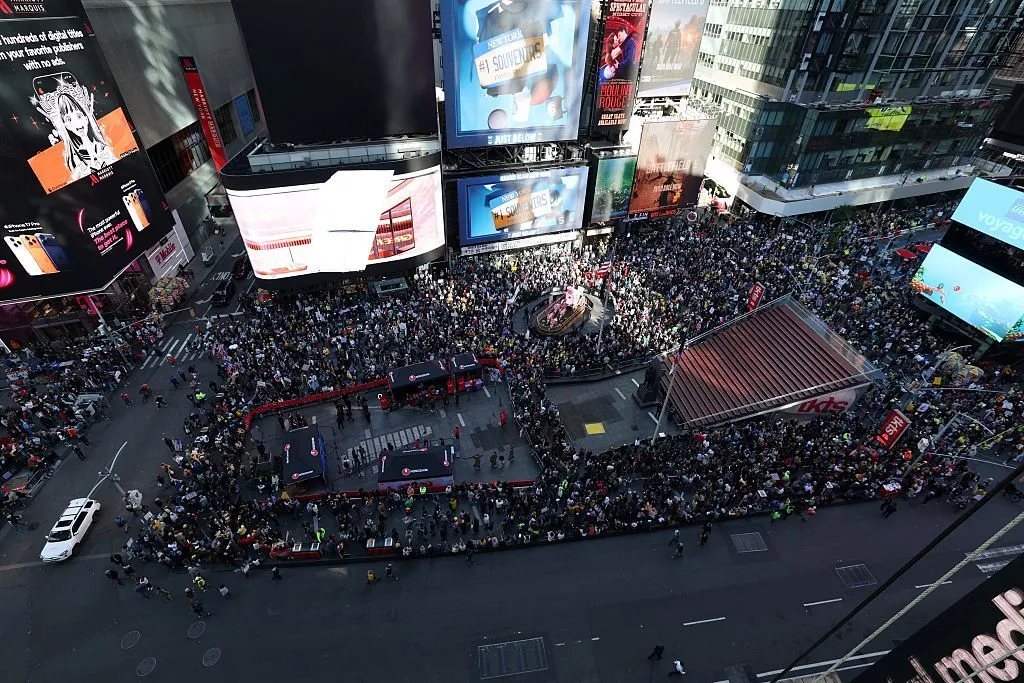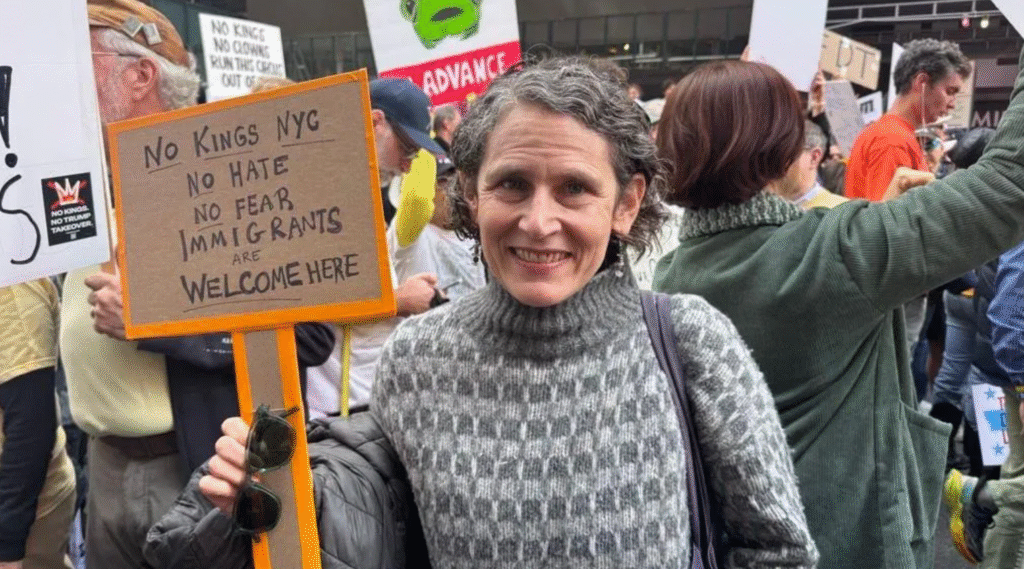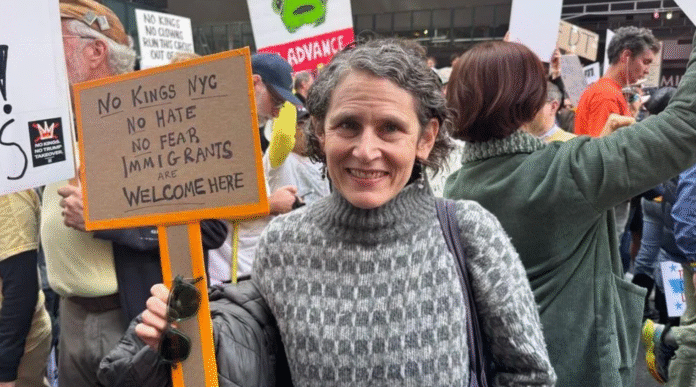Americans Flood Streets in “No Kings” Movement
No Kings protests Trump has become the rallying cry for tens of thousands of Americans who filled major U.S. cities this weekend to denounce what they see as President Donald Trump’s growing authoritarianism.
From Times Square in New York to Los Angeles, Washington D.C., and Chicago, protesters carried signs that read “Democracy, Not Monarchy” and “The Constitution Is Not Optional,” demanding accountability from the White House.
Crowds began forming early Saturday morning, and by midday, New York’s iconic square had transformed into a sea of banners, chants, and camera flashes. Helicopters circled overhead as demonstrators shouted: “This is what democracy looks like,” their voices echoing off the skyscrapers.

A Peaceful but Powerful Display of Dissent
Despite political tension, organizers emphasized that the No Kings protests Trump movement was entirely peaceful. Police officers stood by as drones and helicopters monitored the gathering.
Event marshals used megaphones to guide marchers, reporting an estimated 100,000 participants across the five boroughs, though official numbers remain unverified.
Smaller rallies were also reported in Austin, Seattle, and Boston, creating what some observers called one of the largest nationwide protest days since 2020.
Voices from the Ground: Fear of “Fascism” Rising
For many attendees, this protest was personal.
Beth Zasloff, a New York-based writer, said she joined the march because she feared the country was moving toward authoritarianism. “I care deeply about this city,” she said. “Being surrounded by others who share that belief gives me hope.”
Nearby, 68-year-old Massimo Mascoli, a retired engineer from New Jersey, held a sign reading “This is what democracy looks like.” Mascoli said his family history inspired him to speak out.
“I’m the nephew of an Italian resistance fighter who was killed fighting fascism,” he said. “I never thought I’d see similar warning signs here in America.”
Mascoli criticized Trump’s sweeping use of executive orders, saying they threatened the democratic balance of power. “We can’t rely on Congress or the courts anymore,” he warned. “The people have to stand up.”
The Roots of the “No Kings” Movement
The slogan “No Kings” first appeared online after Trump’s return to the White House, when critics accused him of governing by decree rather than collaboration. His administration’s executive orders, tariff expansions, and deployments of the National Guard to U.S. cities have fueled accusations that he’s blurring the line between leadership and monarchy.
Trump has dismissed such claims as “hysterical,” arguing that his decisions are necessary to restore America’s strength. However, protest leaders argue that true patriotism lies in resistance to unchecked power.
According to political analysts, movements like No Kings protests Trump demonstrate a growing anxiety among voters who see democratic norms being tested in unprecedented ways.
National Guard on Standby Amid Rising Tensions
As the rallies gained momentum, Republican governors in several states placed National Guard troops on alert.
Texas Governor Greg Abbott cited concerns about “antifa-linked demonstrations,” while Democrats accused him of suppressing peaceful protest.
“Sending soldiers to silence dissent is exactly what kings do,” said Texas Representative Gene Wu.
Meanwhile, Virginia Governor Glenn Youngkin confirmed a similar order but said it was precautionary. No Kings protests Trump. Despite these preparations, protests remained calm, with only minor altercations reported.
Solidarity Spreads Beyond U.S. Borders
The impact of No Kings protests Trump reached across the Atlantic. Demonstrations erupted in London, Berlin, Madrid, and Rome, where hundreds gathered outside U.S. embassies waving signs that read “USA: Throwing Off Tyrants Since 1776.”
In London, protesters emphasized unity with Americans defending democratic values. “What happens in the U.S. affects the whole world,” one participant told The Guardian. “When democracy weakens there, it weakens everywhere.”
Trump Responds to “King” Allegations
In a preview of an upcoming Fox News interview, President Trump addressed the nationwide demonstrations with defiance.
“They’re calling me a king,” he said. “I’m not a king, I’m a president. A strong one.”
Senator Roger Marshall of Kansas also weighed in, warning that some protests could turn violent, though no evidence supported that claim. “Hopefully it’ll be peaceful,” he said, “but I doubt it.”
However, many protesters saw Trump’s remarks as further proof of his disregard for public opinion.

Supporters vs. Critics: A Deep National Divide
Polls show that Americans remain sharply divided over Trump’s leadership. A Reuters/Ipsos survey found his approval rating at 40%, with 58% disapproving, similar to his average during his first term.
Political analysts say these numbers underscore how polarized the nation remains, with both sides claiming to defend democracy.
In Washington, Bernie Sanders addressed the crowd, saying, “We’re not here because we hate America, we’re here because we love it.” His words drew loud applause and a renewed chorus of “No kings, no dictators!”
Looking Ahead: What’s Next for the Movement?
Protest organizers have vowed to keep momentum alive, planning follow-up rallies, online town halls, and nationwide voter registration drives before next year’s elections.
The group’s official website emphasizes nonviolence and community solidarity, urging participants to “de-escalate and educate” rather than engage in confrontation.
For protesters like Beth and Massimo, the fight is far from over.
“This is about protecting democracy for our kids,” Beth said. “No one person should ever have that much power, not in America.”

